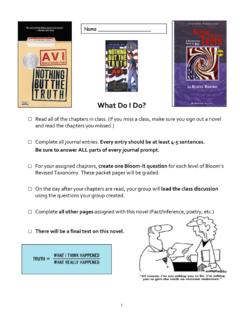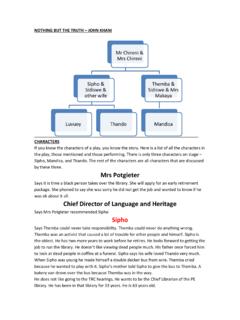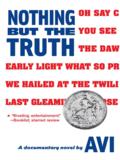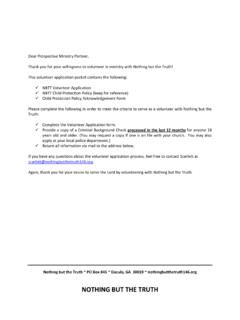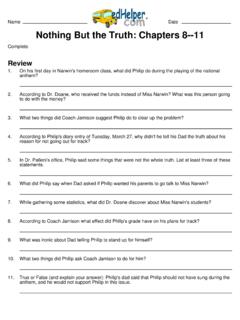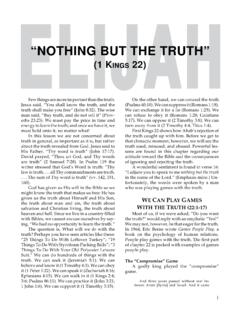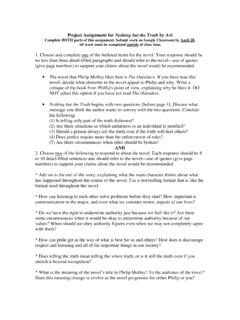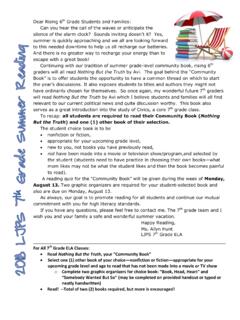Transcription of The Truth, The Whole Truth, and Nothing But The Truth
1 Journal of Biblical Ethics in Medicine Volume 4, Number 3 1 The Truth , The Whole Truth And Nothing But The Truth William F. Duerfeldt, graduate of Kirksville College of Osteopathic Medicine in Missouri, Dr. Duerfeldt is Associate Professor ofFamily Medicine at Ohio University College of Osteopathic Medicine, where he is also coordinator of theMedical Ethics curriculum. In August 1989, the American College of Physicians published a twopart "PositionPaper" on guidelines of medical ethics.' The paper is very thorough beginning with the "Historical View of theEvolution of Medical Ethics" and progressing to such detailed subjects as "Fee Sharing ,""Advertising," and"Physician Strikes.
2 " Interestingly, however, there is virtually no mention of any moral obligation "to tell thetruth." In fact, the only direct reference to veracity at all is in an historical perspective. (The paper reportsthat: "Greek medicine .. was pragmatic. It permitted withholding the Truth from patient and family if itserved the patient's good."2) ThePositionPapercamenearesttoaddressingt hesubjectofveracityandfidelityforthemode rnphysicianthroughseveralindirectreferen cesembodiedinthesetwo statements: "Througheffectivecommunication,the[physi cian/patient]relationshipissealedbyunder standing,mutualacceptance,trustandrespec t,"'and"Thepatientshouldunderstandandapp rovethetreatmentandshouldparticipateresp onsiblyinthecare.
3 "1 Therearesomesignificantshortcomingswithg eneralstatementslikethese, ' "understand,""effectivelycommunicate,"or "participateresponsibly"inhisorhercare? Thecontemporaryethicist,MaryCrenshawRawl inson,pointsoutthat"allillnesstosomedegr eeunderminestheautonomyofthesufferers."5 Shegoesontonotethat: "Themoreserioustheillness,themorethepati entbecomesdependentuponothersnotonlyfort reatment,butalsoforassistanceinmeetingor dinaryresponsibilitiesandincarryingoutth eusualfunctions of daily life. Under the best circumstances, physicians are continuallytryingtoovercome"communicatio ngaps" ,aretheretimeswhenbeneficencemayactually demandwithholdingtheburden of "the Whole Truth " from a patient? ,duringthevastspanofthehistoryofmedicine ,theconceptofpaternalbeneficencefaroutwe ighedanyofthephysician'sotherduties,incl udingthatof"alwaystellingthewholetruth.
4 "Forcenturiesthemedicalprofession"vigoro uslyassertedtheresponsibilityofthephysic iantoprotectthepatientfromknowledgethatm aybeharmfultohimorherandtopracticesuchde ceptionasmaybeessentialtoacure."7[emphas ismine]Oneauthoraccuratelyobservedthatwh atdoctorsreveal,holdback,ordistort, "nottoconfuseasickpersonneedlessly,orcau sewhatmaywellbeunnecessarypainordiscomfo rt,nottoleavethepatientwithouthope,ortoi mprovethe1 Journal of Biblical Ethics in Medicine Volume 4, Number 3 ,therefore,seemedanespeciallyexcusableac t."8 Platoreportedlyarguedthat"doctorsandonly doctors,shouldbegrantedtherighttomanipul atethetruthinwayssoundesirableforpolitic ians,lawyersandothers."9 Likewise,Hippocratesemphasizedthatpracti tionersshould" 'sfuture or present condition.
5 "10 Modemethicaltheories,ontheotherhand, "thetraditionalbenevolentpaternalismofth emedicalpractitionerhascometobeviewedasa noffenseagainstthepatient'sfundamentalan dindivisiblerightofselfdetermination.""B ecauseofthistrend,theancientandtime-hono redfoundationofthephysician/patientrelat ionship-"beneficence"-hasgraduallysuccum bedto the legalistic principle of "informed consent."12 ,forexample, "tobetruthful(honest) ,unconditionaldemandofreason,andnottobel imitedbyanyexpediency."13[emphasismine]P erhapsKant's most famous example is the case of the murdererwhocomestothedoor, , "onedoesnotdoharmtohimwhosuffersasaconse quence;accidentcausesthisharm."14"ToKant theindividualwhosocorruptshisorherownsou l[bywithholdingthetruth]isthe most contemptible of creatures.
6 "15 IsKant'sallegiancetoabsoluteveracityinev erycircumstancereasonable?IsitBiblical?I sitevenpossible?OnenotableHarvardphiloso pher, , once commented: "Tospeakoftellingthetruth, , , "thefallacyofmisplaced concreteness."16 ToadequatelyconsidertheBiblicalperspecti ve,perhapswe,likePontiusPilate,shouldask ,"Whatistruth?" ,HesaidthattheSpiritofTruthwouldbethebel iever'sconstantcompanion"andguide." , ,theApostleJohnwrote,"Forthelawwasgivent hroughMoses;graceandtruthcamethroughJesu sChrist." , ,theBiblicalethicof"truthfulness" ,inhisexcellentbook,Principles of Conduct,makesthefollowing observation: " ,thepermanentascontrastedwiththetemporar y,thecompleteincontrastwiththepartial,th esubstantialincontrastwithethereal,theet ernal as contrasted with the temporal.
7 "23 "Therefore,whenJesussays,`Iamthetruth,'H eisstatingthefactthatHeembodiestheultima te,theeternal,theabsolute,theunderived, " Truth "ismorethensimplyfactversusfiction ,ortrue versus false."24 of Biblical Ethics in Medicine Volume 4, Number 3 325,26,27,28,29 However,astrongBiblicalcasecanbemade(1)t hatdeliberatefalsehoodordeceptionisoneth ing,(2)falsehoodinunderstandingorlimited knowledgeisanotherand,(3)concealmentoftr uthisstill another. Undoubtedly,theclassicandmostwidelydiscu ssedcasesofpartialdisclosureofthe"fulltr uth" ,intheirbookPrinciples of Biomedical Ethics,pointoutthattherehasbeenadramatic shiftinphysicians' "Thereasonsforthechangesincludetheavaila bilityofmoretreatmentoptionsforcancer(in cludingexperimentaltreatments), ,involvementof[multiplehealthcare]profes sionals,alteredsocialattitudesaboutcance r, and increased attention to patients' rights.
8 "31 Unfortunately,apatient's"righttoinformat ion" struggles with the reality of the patient's loss offunctionalautonomy,issuessuchasthepati ent'sage,intelligence, ,notsurprisinglytothoseofusinclinicalpra ctice,thepressuresof"familywishes"oftenp layasignificantroleinaphysician' ,ina1979survey,51%ofphysiciansidentified "arelative'swishesregardingdisclosuretot hepatient"asthe deciding factor!32 This unsettling statistic promptedBeauchamp to raise the pointed question: "Bywhatrightdidthephysicianinitiallydisc loseinformationtothefamilywithoutthepati ent'sconsent?"33; Theimpliedanswer,ofcourse,isthephysician hadnoright to do so! Consider the following scenario: ,andsayshe"isfeelingbetter." Onphysicalexamination, ,becauseofthesizeofthe nodules the prognosis would be very poor even 's last days.
9 ,orconcealit?Ifasked,shouldhedenyit,fear ingarelapseofthepatient'sdepressionorano thersuicideattempt?Ifhedecidestorevealth ediagnosis,shouldhedelaydoingsountilafte rthepatientreturnsfromhisvacation?Finall y,ifthephysiciandoesrevealtheseriousnatu reofthediagnosis,shouldhementionthepossi bilityofchemotherapyandhisreasonsfornotr ecommendingitinthiscase?Orshouldheencour ageevery last effort to postpone death?34 Physiciansencounterthesekindsofchoicesal mostdaily, ,35,36,37aswellasKant,thesearereallynon- issues, ,weshallseethatthereareexamplesinScriptu rewhichseemtosuggestthatthe"issueoftruth fulness"maynotalwaysbe so straightforward. Letuslookparticularlyattheissueof"concea lment," , of Biblical Ethics in Medicine Volume 4, Number 3 4 InthispassageofScripture,theLordhimselfg ivesSamuel the following instructions: "Fillyourhornwithoil,andgo;Iwillsendyout oJessetheBethlehemite, ,'HowcanIgo?
10 WhenSaulhearsofit,hewillkillme.'AndtheLo rdsaid,'Takeaheiferwithyouandsay[toSaul] .IhavecometosacrificetotheLord."38 Withoutadoubt, "evasion,"butregardlessofsemantics,thege neralissueisconcealmentoftheessentialfac tsofSamuel'smission. ,"Thisisnottheway,noristhisthecity;follo wmeandIwillbringyoutothemanwhomyouseek." 39 ElishathenleadstheSyrianstoSamariawheret hey,inturn, , "ThemaraudingbandsofSyriadid not come again into the land of Israel."40 born to the Hebrews. "SotheKingofEgyptcalledforthemidwives,an dsaidtothem,'Whyhaveyoudonethisthingandl ettheboyslive?'AndthemidwivessaidtoPhara oh,'BecausetheHebrewwomenarenotastheEgyp tianwomen,fortheyarevigorous,andtheygive birthbeforethemidwifecangettothem.
